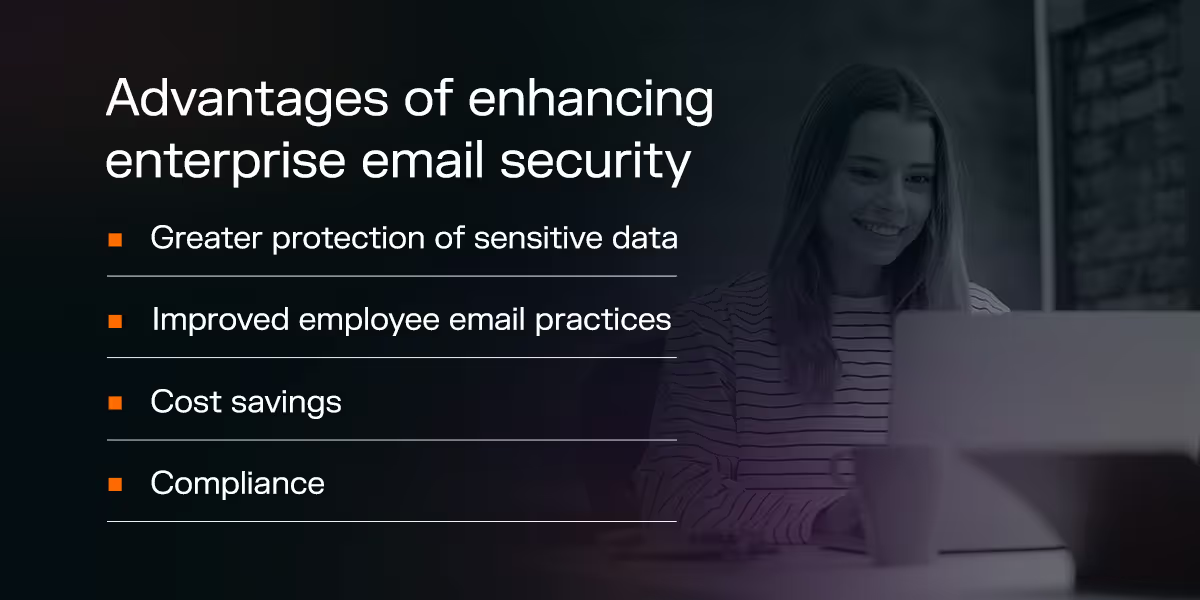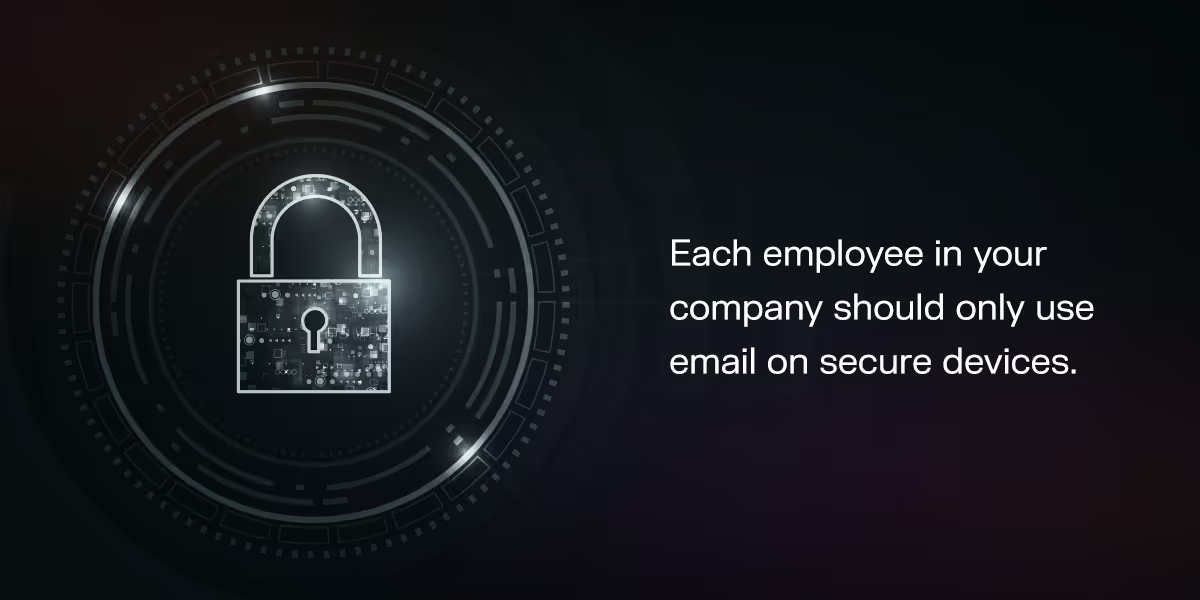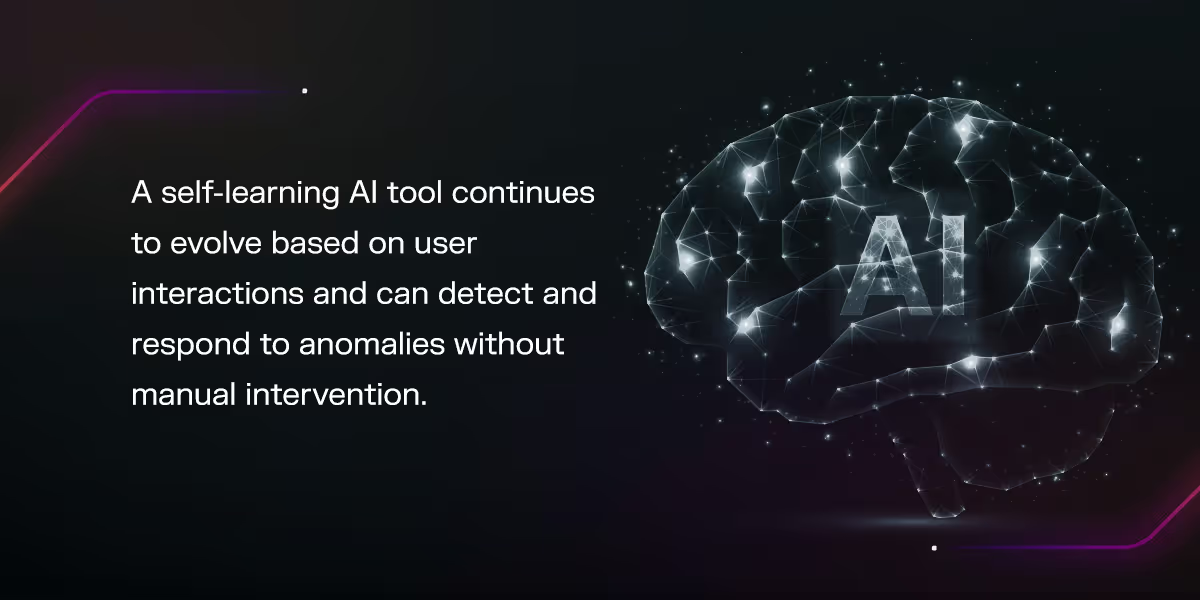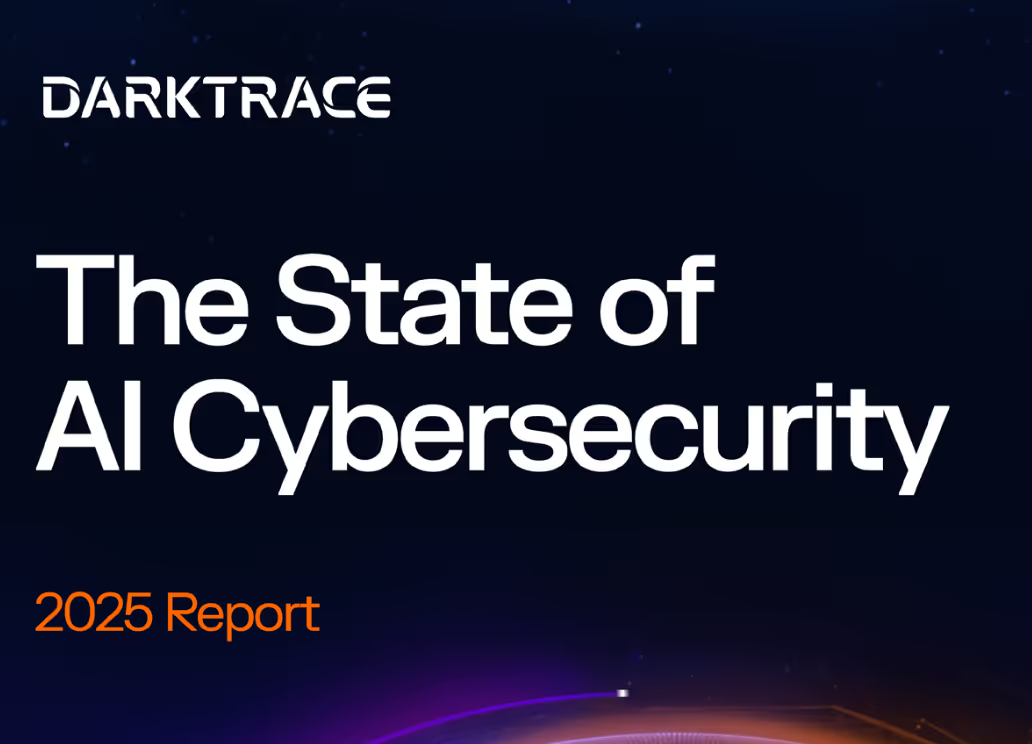Enterprise-level email security
Enterprise-level email security
Email is still the most commonly used communication tool worldwide. It's also one of the most frequently used channels for cyber-attacks, like business email compromise (BEC).
Today's businesses face a unique challenge when it comes to email security — cyber criminals are becoming more sophisticated in their techniques at a rapid pace. This evolution calls for a more aggressive approach to email security to mitigate the risk of an attack and costly data breach.
Large organizations in particular require robust, enterprise-level security solutions to successfully fortify their systems, as corporations are one of the top targets for cyber crime.
Importance of enterprise email security
Enterprise email security involves technologies, processes, and policies that prevent cyber-attacks. Organizations of all sizes are susceptible to internal and external email-based threats such as phishing attempts, malware, spam emails, and data breaches.
However, larger enterprises are particularly susceptible to cyber-threats because they might process thousands of emails a day, providing numerous avenues for cyber criminals to launch an attack. A large company may also have thousands of employees and more opportunities for human error. Addressing these risks demands comprehensive email security.
Robust email security is also critical to combat ever-advancing cyber-attack strategies. For example, today's cyber criminals leverage artificial intelligence (AI) to advance attacks, so it's becoming increasingly crucial to use AI-driven threat detection and response. Advanced AI technology learns your organization's specific email behaviors and patterns to recognize anomalies and stop threats immediately.
Overall, enhancing enterprise email security is vital because it offers the following advantages:

Greater protection of sensitive data: Enterprise email security prevents cyber criminals from accessing, stealing, and corrupting your company's sensitive information and data. You and your employees can share highly confidential or restricted information with confidence and peace of mind.
Improved employee email practices: Enterprise email security improves employee email practices by highlighting potential threats and enforcing policies such as strong passwords and data encryption. It also proactively filters malicious emails so employees are at a lower risk of opening harmful links.
Cost savings: Greater security results in cost savings because it prevents significant data loss and potential operational disruptions.
Compliance: Protecting your company's data and customer or client information is essential for compliance. Safeguarding private information helps your company comply with regulations such as the Payment Card Industry Data Security Standard (PCI-DSS) and the Health Insurance Portability and Accountability Act (HIPAA).
Enterprise email security best practices
The following best practices enhance email security to better protect your organization's data and communications:
Strengthen your secure email gateway
A secure email gateway (SEG) is a type of software designed to filter out malicious emails. Your SEG is your company's first line of defense, protecting against threats like malware and phishing, including BEC.
While SEGs are vital to guarding against various email threats, they are limited in their ability to thwart sophisticated evasion techniques. SEGs may also produce false positives, flagging legitimate emails as malicious.
Consider enhancing your SEG with advanced threat detection tools to stay on top of the latest cyber crime tactics. In some cases, AI technology can learn on its own, continually adapting to authorized user patterns and immediately detecting and responding to deviations like phishing attempts. These tools catch and respond to threats faster and more effectively than ordinary SEGs, keeping them from reaching employee inboxes.
Adopt effective email encryption
Email encryption is especially crucial for enterprise email because of the sensitive information and data involved. The following email encryption formats can help enhance your enterprise email security:
- Secure/multipurpose internet mail extensions (S/MIME) encryption: S/MIME encryption uses asymmetric cryptography and digital signatures to ensure only recipients with the corresponding private key can access an email's content.
- Transport layer security (TLS) protocol: TLS encryption enables servers to generate digital certificates and a shared secret key for all communication. This “handshake” process requires clients and servers to authenticate each other, preventing unauthorized parties from intercepting and reading emails in transit.
Limit use to secure devices

Each employee in your company should only use email on secure devices. Unsecured devices can leave communications vulnerable, so it's important to ensure company devices are trackable, encrypted, and compliant.
Enhance security for remote workers
Enterprise email security is especially vital for remote workers because they may access email from personal networks. The following strategies can help you enhance email security for remote workers:
- Virtual private network (VPN) implementation when using a public Wi-Fi source
- Multi-factor authentication (MFA)
- Strong password policies
- Strong encryption
- Device updates with the latest security patches
Train employees with realistic phishing simulations
While technological and systematic safeguards are the most important parts of enterprise email security, employees also play a crucial role. Your IT team can train employees to recognize and respond to emerging email-based attacks by simulating real-world incidents in your unique digital environment.
Phishing simulation involves sending emails that imitate realistic phishing attempts to employees. This testing method allows IT teams to see how each employee would respond when facing an actual threat, enabling them to tailor security training to each person.
Training employees through phishing emulations does not have to be a time-consuming, costly process. Your IT team can harness AI technology to generate realistic phishing simulations based on company assets and automatically send them to employees at regular intervals. Al can then track, record, and document the simulation results, as well as generate personalized feedback based on employee interactions.
Demystifying AI-driven email security solutions
With the many different security solutions on the market, it's crucial for enterprises to understand what they're getting and whether it offers the best protection against novel threats. Some enterprise email security solutions claim to use AI but only incorporate generative AI for phishing simulation prompts, or they might use supervised machine learning to detect malicious code.
While supervised machine learning enhances threat detection, it still falls short of recognizing novel attacks because it learns through a labeled training dataset. In other words, supervised machine learning is incapable of self-learning and requires a first victim or “patient zero” to collect breach-related data and update its intelligence database so it knows what to look for in the future. Fortunately, there are other ways to leverage AI for greater protection against novel threats.

For example, organizations can integrate their existing email infrastructure with an autonomous, Self-Learning AI security tool. A self-learning AI tool continues to evolve based on user interactions and can detect and respond to anomalies without manual intervention. This type of tool saves your IT department time and streamlines workflows while also stopping attacks before there's a victim.
Learn more about advanced solutions for enterprise-level email security
Enterprise-level email requires enhanced security to detect and stop sophisticated threats. Darktrace / EMAIL uses self-learning AI to learn your organization's typical email patterns, automatically detect unusual behavior, and stop threats before they become incidents.
Implementing Darktrace / EMAIL in your enterprise email security infrastructure protects your sensitive data and information, reduces costs, and reduces investigation time for your security team. Darktrace has been pioneering AI since 2013, enabling us to stay ahead of the most advanced threats facing your organization. Read the Darktrace / EMAIL Solution Brief to learn more about how this dependable solution can protect your brand, data, and domain.


























